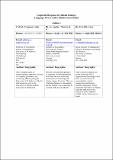Corporate response to climate change : language, power and symbolic construction
Abstract
Purpose – The objective of this paper is to explore corporate communications related to climate change in both a voluntary and mandatory setting. Adopting a critical perspective, the paper examines how companies who participated in the voluntary UK Emissions Trading Scheme (UK ETS) and the UK Government’s mandatory Carbon Reduction Commitment Energy Efficiency Scheme (CRC) positioned themselves within the climate change debate. In particular, our analysis draws attention to how companies, through their communicative practice, helped to constitute and reproduce the structure of the field in which they operate. Design/Methodology/Approach – A context-sensitive discursive analysis of 99 stand-alone reports produced by companies participating in the UK ETS and CRC over a nine-year period. Our analysis is informed by Thompson’s (1990) depth-hermeneutic framework, which mediates the connection between linguistic strategies and the institutional field. Findings - Our analysis suggests that companies tended to adopt particular linguistic strategies in their communications related to climate change. For example, the strategy of ‘rationalization’ was employed in order to emphasise the organisational ‘opportunities’ resulting from climate change; in this sense, companies sought to exploit climate crises in order to advance a doctrine that endorsed market-based solutions. A noteworthy finding was that in the mandatory CRC period, there was a notable shift towards the employment of the strategies that Thompson (1990) refers to as ‘differentiation’ - whereby companies attempted to displace responsibility by presenting either government or suppliers as barriers to progress. Originality/Value – This paper explores how disclosure on climate change evolved while organisations participate in voluntary and compulsory climate change initiatives. In this respect, the analysis is informed by the social and political context in which the disclosure was produced.
Citation
Ferguson , J , Sales de Aguiar , T R & Fearfull , A 2016 , ' Corporate response to climate change : language, power and symbolic construction ' , Accounting, Auditing & Accountability Journal , vol. 29 , no. 2 , pp. 278-304 . https://doi.org/10.1108/AAAJ-09-2013-1465
Publication
Accounting, Auditing & Accountability Journal
Status
Peer reviewed
ISSN
0951-3574Type
Journal article
Collections
Items in the St Andrews Research Repository are protected by copyright, with all rights reserved, unless otherwise indicated.

